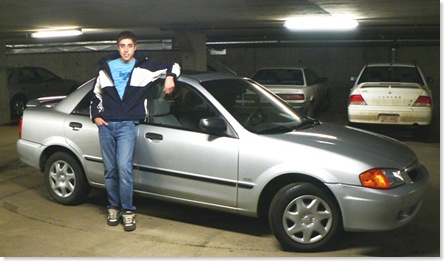Things get taken. Things get lost. Things are never owned. We only get to use them for a while. In this life, renting, is a closer approximation of our relationship with things. Wether it’s a capacity, an opportunity, or an object, like my son’s first car, stolen during the night…things get taken, wear out, get lost.
We are fooled into believing in the permanence of ownership by the laws we write and the language we use. Yet truly, we are only tenants, lessees, boarders…never proprietors…never outright owners. It is, I suppose, possible to use the language of ownership as long as we realize it rests on a rolling sea of temporality. But in practice, we have bought into ownership as something fixed. We live in the unreality of "private property," private possessions. And the degree to which we give possession credence is the degree to which we are ourselves possessed. Owned by what we think we own.
Not that we shouldn’t mourn, grieve, get angry, over loss. To do otherwise would be robotic. It is what we end up doing with that grief or anger that informs our life. A position of ownership will have us obsessing over security and adding to our bondage.
You may recall learning that early residents of the land never lived by any concept of ownership. Ownership was quite literally a foreign concept. They lived, for the most part, as stewards. A concept our western sensibility has skewed irretrievably. Even, I suppose, in disputes of hunting territory, (however this was framed because territory was an unknown notion) "territory" was seen as a gift, not a right.
Perhaps it’s our material and mechanistic outlook that has contributed to all our ideas of possession. If our universe is all blind happenstance there is no-thing to be thankful to. Whether this is a good enough reason to believe in transcendence is questionable. But to be caught being profoundly thankful, (a ubiquitous human experience) with no one to thank, is stultifying and robs us of a certain pliability. Thankfulness, after all, keeps us from hardening, and is a prime way to hang on to things loosely.
And this hanging on loosely, what the monastics call detachment, is the way we must walk through our life if we are to have a chance at flourishing. That’s because the closer we live to what’s true about our world, the freer we are. The more we live in obligation to creation, the more we grow, the more we create.
So my son, after that very crappy feeling goes away, here’s to d’Artagnan II. May she run long, but never own you.


So sad for your loss, Mark
pits. all those feelings of violation. they are there until we acsend…..we’re lucky to do that in our lifetime. what do i have? materially, a computer, camera, vans and the gadgets that go with it. things go missing. i’m peeved when it’s someone who takes it for drug money. if they wanted food i would cook for them. if they wanted clothing i would give them some. if they wanted shelter they could have my platic tarp. all one has to do is ask.
the beggar in the street asks me for money. i tell him what i have to give he probaby doesn’t want. what’s that, he asks? i say, ‘healing’. it’s turned down more often then not.
my truest treasure in the world – my daugher’s love.
You put your finger on it beautifully.